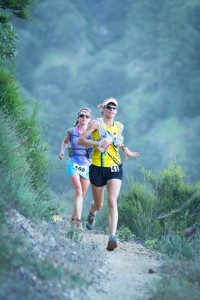 |
| (Anish in the home stretch, some 20 lbs lighter) |
Then a day later, Josh Garrett, a 30-year-old Santa Monica fitness instructor, completed the same PCT through hike in a supported* fashion in 59 days, 8 hours, 59 minutes. Both hikers averaged over 45 miles a day.
 |
| (Matt Kirk on the AT, photo courtesy of Matt Kirk) |
 |
| (Hal and Mike on the JMT) |
 |
| (Jenny Capel tackles the TRT) |
Yassine Diboun and Brian Donnelly are out on the PCT Oregon section now to set a new unsupported record there, and there's probably a few more tackling the other stretches. Simply amazing what these guys are doing!
And no doubt, I'll be hearing the acronym-laded "did you hear MK set the FKT on the AT?" in ultra conversations to come... ;-)
- SD
* Here are the definitions of unsupported, supported, and self-supported per the FKT ProBoard:
Supported, self-supported, unsupported? What does it mean?
Supported means you have a dedicated support team that meets you along the way to supply whatever you need. This generally allows for the fastest, lightest trips, and for an element of camaraderie and safety, since someone knows about where you are at all times.
Self-supported means that you don't carry everything you need from the start, but you don't have dedicated, pre-arranged people helping you. This is commonly done a couple different ways: You might put out stashes of supplies for yourself prior to the trip, or you might just use what's out there, such as stores, begging from other trail users, etc.
Unsupported means you have no external support of any kind. Typically, this means that you must carry all your supplies right from the start, except any water that can be obtained along the way from natural sources. This approach has also been termed "alpine style". The longest trip I'm aware of using this style is Coup's 20-day thru-hike of the Colorado Trail. For most people, carrying enough food for more than a few days to one week will be prohibitive. Unsupported also means unaccompanied!
